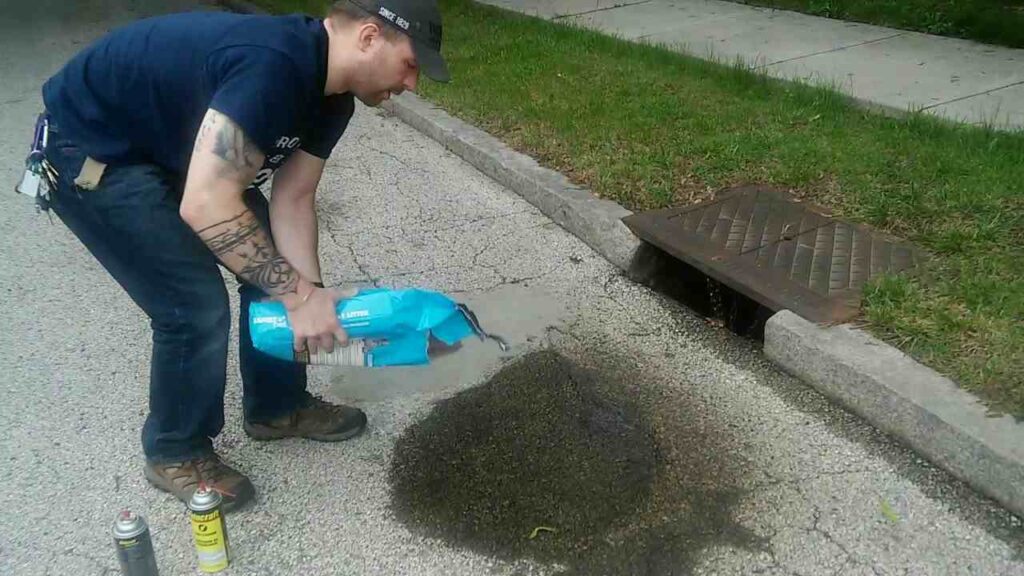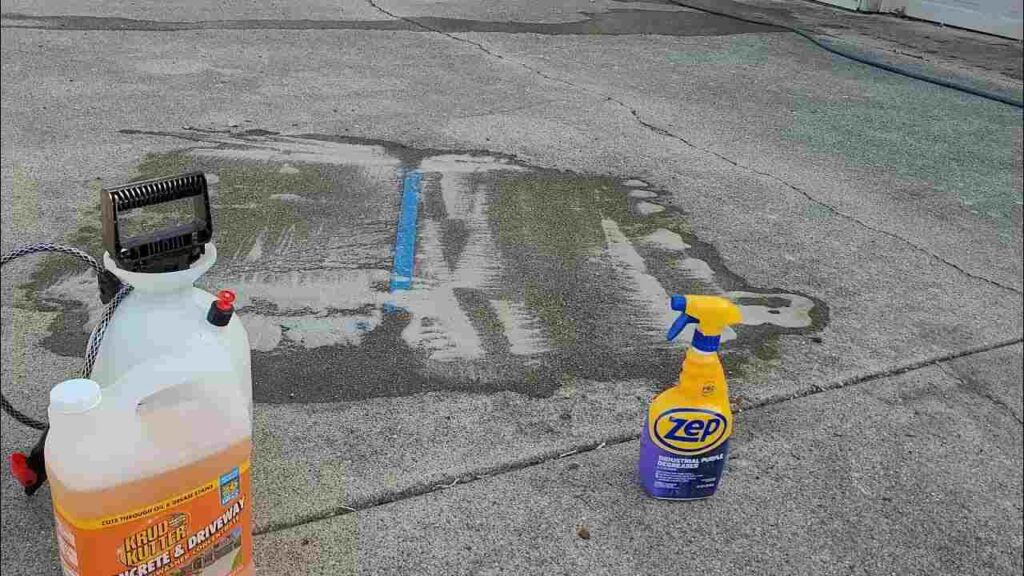Oil stains on your driveway can be an eyesore, but they’re more common than you might think. Whether it’s from a leaky car, spilled motor oil, or the remnants of a DIY project, these stains can be frustrating to deal with. Fortunately, with the right approach and materials, removing oil stains can be straightforward. In this guide, supported with Evergreen Landscaping of Cincinnati, we’ll explore the best techniques and products to help you tackle those stubborn oil stains and keep your driveway looking fresh and clean.

From household items to specialized cleaners, there are several effective methods to restore your driveway’s appearance. Plus, taking care of these stains not only enhances your home’s curb appeal but also helps prevent further damage to the surface. Regular maintenance can prolong the life of your driveway services, saving you from costly repairs down the line. By addressing oil stains promptly, you can maintain a clean and inviting entrance to your home that reflects your attention to detail.
Understanding Oil Stains: How They Form and Why They Matter
Oil stains on driveways can be a frustrating eyesore for homeowners. They typically result from vehicle leaks, spills during oil changes, or even cooking oil from outdoor grilling. Understanding how these stains form is crucial for effective removal. Oil penetrates the porous surface of concrete or asphalt, making it harder to clean as time passes. The longer a stain sits, the deeper it penetrates, leading to permanent discoloration if not treated promptly. Moreover, oil stains not only detract from your home’s curb appeal but can also weaken the driveway material over time, leading to cracks and deterioration. To enhance the overall appearance of your driveway and create a clean separation from landscaping, consider using borders made of stone or brick.
Essential Tools and Materials for Oil Stain Removal
To effectively remove oil stains from your driveway, having the right tools and materials is essential. Common household items can work wonders, such as dish soap, baking soda, or white vinegar, which can help break down the oil. However, some homeowners may encounter issues like the stain being too old or deep, making it more challenging to remove. In these cases, purchasing a commercial degreaser specifically designed for removing oil from concrete or asphalt surfaces can be beneficial. A stiff brush or broom will be necessary to scrub the area, while a pressure washer can provide the extra power needed for more stubborn stains.
DIY Methods for Removing Fresh Oil Stains
Fresh oil stains are easier to remove than older ones, and immediate action can yield great results. Start by blotting the stain with paper towels or a clean rag to soak up excess oil—avoid rubbing, as it can spread the stain further. Once the area is blotted, sprinkle a generous amount of baking soda or cornstarch over the stain. These absorbent materials will soak up the remaining oil. Let it sit for at least 15 minutes, then sweep it away. If the stain persists, mix a solution of dish soap and warm water and scrub the area with a stiff brush. Rinse thoroughly with water, and repeat if necessary for a clean driveway.
Using Baking Soda: A Natural Solution for Old Stains
Baking soda is an excellent natural option for tackling old oil stains on your driveway. Its absorbent properties help lift oil from the surface without harsh chemicals. To use it, start by sprinkling a generous amount of baking soda directly onto the stain. Let it sit for several hours, or ideally overnight, to allow it to absorb the oil. After this, use a stiff brush to scrub the area, working the baking soda into the stain. Rinse the area thoroughly with water to wash away the baking soda and any lifted oil. This method is not only eco-friendly but also cost-effective, making it a popular choice for homeowners looking for simple solutions.
How to Use Cat Litter for Oil Absorption
Cat litter is another household item that can effectively absorb oil stains from driveways. Its absorbent nature helps lift oil from the porous surface, making it an excellent choice for tackling fresh and older stains. To use cat litter, start by sprinkling a generous amount directly onto the oil stain. Let it sit for at least a few hours or overnight for the best results. After the waiting period, sweep the litter away and check the stain. If necessary, repeat the process with fresh cat litter until the stain is significantly reduced or eliminated. This method is not only easy to execute but also economical, making it a popular choice for many homeowners.
Commercial Cleaners: When to Consider Professional Products
Sometimes, DIY methods may not be sufficient to remove stubborn oil stains from your driveway. In these cases, commercial cleaners specifically designed for oil stain removal can be highly effective. These products typically contain powerful degreasers that can break down oil and lift stains from concrete and asphalt surfaces. When selecting a commercial cleaner, look for one that is compatible with your driveway material and follow the manufacturer’s instructions for use. It’s important to apply these products in well-ventilated areas, as they can contain harsh chemicals. While they may require a higher upfront investment, they can save you time and effort, yielding quicker and more satisfying results.

Pressure Washing: A Powerful Technique for Stubborn Stains
Pressure washing is a highly effective method for removing stubborn oil stains from driveways. This technique uses high-pressure water jets to dislodge dirt and grime, including embedded oil stains. Before using a pressure washer, it’s crucial to prepare the area by removing any loose debris and applying a degreaser if the stain is particularly tough. Once set up, hold the pressure washer nozzle about a foot away from the stain and use sweeping motions for even coverage. Move slowly over the stained area to ensure thorough cleaning. Afterward, rinse the area with water to wash away any remaining residue. Pressure washing can restore the appearance of your driveway while enhancing its longevity.
Preventing Future Oil Stains: Tips for Maintenance
Preventing future oil stains on your driveway is easier than you might think. Start by regularly inspecting your vehicles for leaks and addressing any issues promptly. Parking mats or trays can catch spills and drips, protecting the driveway surface. Additionally, consider using a sealant on your driveway, which can create a barrier against oil and other stains. Regularly cleaning your driveway with soap and water will help maintain its appearance and reduce the chances of oil buildup. Lastly, creating designated oil change areas with absorbent mats or tarps can also minimize the risk of spills. These proactive measures can keep your driveway looking clean and well-maintained for years to come.
The Importance of Prompt Stain Removal
Promptly addressing oil stains is essential for maintaining the appearance and integrity of your driveway. The longer oil sits on the surface, the deeper it penetrates, making it significantly more challenging to remove. Ignoring stains can lead to permanent discoloration, which can detract from your home’s overall curb appeal. Additionally, untreated oil stains can contribute to the degradation of the driveway material, leading to cracks and other damage over time. By taking immediate action when a stain occurs, you can save time and effort in the long run. Regular maintenance and timely cleaning not only preserve your driveway’s aesthetics but also extend its lifespan, ultimately saving you money on repairs and replacements.
Eco-Friendly Options for Driveway Cleaning
For homeowners concerned about environmental impact, several eco-friendly options are available for driveway cleaning. Many natural cleaning agents, like vinegar, baking soda, or lemon juice, can effectively tackle oil stains without harming the environment. These substances break down oil without introducing harsh chemicals into your driveway or surrounding areas. Additionally, using a pressure washer allows you to clean your driveway efficiently without the need for chemical cleaners, as high-pressure water can lift dirt and grime effectively. When choosing commercial cleaners, look for eco-friendly brands that offer biodegradable ingredients. By opting for green cleaning methods, you can maintain a clean driveway while also protecting the planet.
When to Call a Professional for Driveway Cleaning Services
While many oil stains can be handled with DIY methods, there are times when calling a professional for driveway cleaning services is the best option. If your driveway has extensive staining, deep-rooted oil marks, or if you’ve tried multiple cleaning methods without success, a professional service can provide specialized equipment and expertise to restore your driveway. Professionals often use advanced techniques such as steam cleaning or industrial pressure washers, ensuring a thorough cleaning without damaging the surface. Additionally, they can assess your driveway’s condition and recommend appropriate maintenance measures to prevent future stains. If you’re looking for a hassle-free solution or have concerns about damaging your driveway, enlisting professional help can yield outstanding results.
Conclusion
Removing oil stains from your driveway is essential for maintaining both its appearance and longevity. By understanding how these stains form and utilizing effective methods, from DIY solutions like baking soda and cat litter to commercial cleaners and pressure washing, you can restore your driveway’s look. Regular maintenance and prompt action are key in preventing future stains, ensuring your driveway remains clean and inviting. Moreover, eco-friendly cleaning options allow you to protect the environment while achieving great results. If you encounter stubborn stains or extensive damage, don’t hesitate to call in professionals. Ultimately, a clean driveway not only enhances your home’s curb appeal but also contributes to the overall value of your property.
FAQs
What is the best household item to remove oil stains from a driveway?
Baking soda is an excellent choice for removing oil stains. Sprinkle it on the stain, let it sit for a few hours, then scrub with a brush and rinse with water.
Can I use a pressure washer to clean oil stains?
Yes, a pressure washer can effectively remove oil stains, especially when used with a degreaser. Just ensure you use the appropriate nozzle and distance to avoid damaging the driveway surface.
How long should I let the cleaning solution sit on the stain?
Most cleaning solutions should sit for at least 15-30 minutes to effectively break down the oil. For tough stains, longer soaking may be beneficial, so check the manufacturer’s instructions.
Are there any eco-friendly options for removing oil stains?
Yes, you can use natural ingredients like baking soda, vinegar, or dish soap mixed with water. These options are effective and environmentally friendly.
What should I do if the oil stain persists after cleaning?
If the stain remains, consider using a commercial degreaser specifically designed for driveway stains or consult a professional cleaning service for more intensive treatment.
